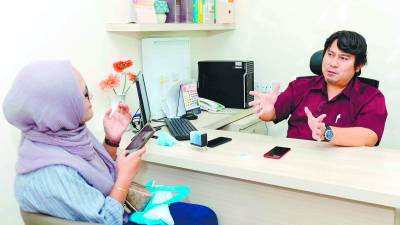LET’S not kid ourselves, darlings. The average Malaysian office worker deserves a national award – preferably one that comes with a spa voucher and a lifetime supply of paracetamol. Every day, they sit there replying to emails with the serenity of a monk while inside they are screaming louder than your auntie when she realises her Shopee parcel has been “delivered” to the wrong taman.
And when the stress bubbles over, where do they go? HR? Oh, please. HR is about as comforting as a “Dear valued customer” email from your telco. Smiles? Yes. Empathy? Only if you count “Noted, thanks” as emotional support. This is precisely why corporate Malaysia needs proper counselling units – not as a shiny CSR gimmick or some budget wellness trend but also as part of the company’s basic survival kit.
From the glossy public-listed companies bragging about “people-first culture” on Bursa to the factories in Klang – where the only motivational poster says “Safety First (except deadlines)” – everyone needs it.
Because right now, many companies seem to think “mental health support” means dropping wellness quotes into the WhatsApp group. “Stay strong, success is in your hands!” they say. Darling, if success were really in my hands, I’d be holding a cocktail in Langkawi, not a broken stapler in PJ.
Let’s be honest: no one’s buying the act anymore. The same companies posting pastel infographics about self-care are the ones expecting staff to reply to emails at 11.59pm. And public-listed companies – wah, you lot really love your LinkedIn pageantry – where CEOs stand proudly beside a banner declaring, “People are our strength”.
Cute sentiment, yes, but if people are truly your strength, why does the office pantry look like a post-apocalyptic scene? Even the Milo machine has trauma.
Here’s the hard truth: counselling is not a luxury; it is corporate insurance. Your staff are juggling unpaid overtime, moving goalposts and that one colleague who insists on “Reply All” to announce lunch orders. The least you could do is provide a qualified professional to talk to – not Sharon from HR, who thinks “therapy” means “have you tried breathing exercises?”
And let’s not confuse therapy with those forced team-building retreats in Janda Baik. Dragging exhausted employees to do trust falls in the jungle doesn’t build trust; it builds resentment and bruises. If anything, most staff spend the bus ride home mentally updating their resumes while plotting revenge via anonymous Glassdoor reviews.
Imagine instead a proper in-house counselling unit – a quiet, confidential room. A trained counsellor who actually listens when you say your manager’s “urgent” emails give you chest pains and who doesn’t respond with, “We’ll discuss this after appraisal”. Revolutionary, kan?
For those who need numbers to care (hello, boardrooms), here’s the business case. Happy staff = productivity. Supported staff = lower turnover. Lower turnover = fewer awkward shareholder questions. Therapy saves money. Because nothing ruins “investor confidence” faster than half your Gen Z hires quitting to become artist TikTok after one quarterly report. Now imagine the annual report looking like this: “Revenue: Up 10%. Staff attrition: Down 15%. Number of emotional breakdowns in toilet cubicles: Finally decreasing.
For once, a sustainability report may actually sustain something other than corporate ego. But let’s not forget that Malaysians are champions of silent suffering. Boss, yells? “Sabar-je.” Colleague dumps last-minute work? “Tak apa lah, makan dulu.” That’s our national coping mechanism: mild, passive aggression garnished with sambal. Except, the more we bottle it up, the more it eventually explodes – sometimes in the form of a viral TikTok clip featuring an employee dramatically announcing “I QUIT!” during a town hall. Try explaining that to investors.
So, dear corporate darlings clutching your Montblanc pens and KPI dashboards: counselling is not a cost centre; it is damage control. It is the difference between having a workforce that shows up bright-eyed and one that is Googling “how to fake my own death convincingly” during lunch hour.
And before anyone says, “but we already offer external counselling benefits”, let’s be real – outside therapy costs as much as a monthly car loan. When an employee is already choosing between groceries and Grab rides, do you think they will fork out RM250 per session just to talk about workplace burnout? If companies don’t provide it, people will keep bottling things up, bingeing K-dramas till 3am and showing up to work powered by caffeine and emotional denial.
Let’s make it simple: your office doesn’t need another foosball table, bean bag or pastel “You Got This!” poster. What it needs is a professional counselling unit, staffed by real therapists, who listens before stress swallows your employees whole. Because when people feel safe, they stay. When they feel seen, they contribute. And when they feel like their company actually cares, they may just stop fantasising about becoming a durian seller in Raub.
Corporate Malaysia, it is time to evolve. Less “synergy”, more therapy. Less hashtags, more helplines. Because, in the end, free Milo is nice but mental health is what keeps the company running. And trust me, resignations cost more than therapy sessions. Always.
So, as you sip your artisan coffee and prepare for another “resilience webinar”, remember this: The real resilience isn’t in pretending everything’s fine; it is in building systems that help people when it’s not.
Now, if you’ll excuse Makcik, she’s off to write her next love letter to HR departments everywhere because this commentary, sayang, follows right after the real conversation lit up theSun’s front page yesterday. You heard it here, second… but sassier.
Azura Abas is the associate editor of theSun. Comments: letters@thesundaily.com
